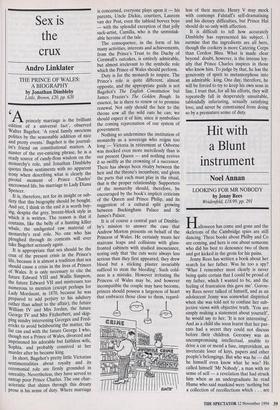Sex is the crux
Andro Linklater
THE PRINCE OF WALES: A BIOGRAPHY by Jonathan Dimbleby Little, Brown, f20, pp. 620 Aprincely marriage is the brilliant edition of a universal fact', observed Walter Bagehot. 'A royal family sweetens Politics by the seasonable addition of nice and pretty events.' Bagehot is the journal- ises friend on constitutional matters. A master of the eye-enticing phrase, he is a ready source of candy-floss wisdom on the monarchy's role, and Jonathan Dimbleby quotes these sentiments with no apparent irony when describing what is clearly the pivotal moment of Prince Charles' uncrowned life, his marriage to Lady Diana Spencer.
It is, therefore, not for its insight or sub- tlety that this biography should be bought. And yet, I think in the end it is worth buy- ing, despite the grey, breeze-block style in which it is written. The reason is that it contains, like the belly of a hunting killer Whale, the undigested raw material of monarchy's real role. No one who has ploughed through its contents will ever take Bagehot seriously again. It is appropriate that sex should be the crux of the present crisis in the Prince's life, because it is almost a tradition that sex should cause a crisis in the lives of Princes of Wales. It is only necessary to cite the future Edward VIII and Wallis Simpson, the future Edward VII and mistresses too numerous to mention (except perhaps for Lady Mordaunt, in 1870, because he was prepared to add perjury to his adultery rather than admit to the affair), the future William IV and Mrs Jordan, the future George IV and Mrs Fitzherbert, and skip- ping sundry intervening Georges and Fred- ericks to avoid belabouring the matter, the list can end with the future George I who, though not a Prince of Wales, divorced and imprisoned his adorable but faithless wife, Sophia, and probably connived at her murder after he became king.
In short, Bagehot's pretty little Victorian sentimentalities about royalty and its ceremonial role are firmly grounded in unreality. Nevertheless, they have served to entrap poor Prince Charles. The one char- acteristic that shines through this dreary prose is his sense of duty. Where marriage is concerned, everyone plays upon it — his parents, Uncle Dickie, courtiers, Laurens van der Post, even the tabloid bower boys — with the splendid exception of that jolly sack-artist, Camilla, who is the unmistak- able heroine of the tale.
The consequence, in the form of his many activities, interests and achievements, from the Prince's Trust to the Duchy of Cornwall's oatcakes, is entirely admirable, but almost irrelevant to the symbolic role which the Prince of Wales should perform.
Duty is for the monarch to inspire. The Prince's role is quite different, almost opposite, and the appropriate guide is not Bagehot's The English Constitution but James Frazier's The Golden Bough. In essence, he is there to renew or to promise renewal. Not only should the heir to the throne sow all the wild oats he can; we should expect it of him, since it symbolises the coming rejuvenation of our system of government. Nothing so undermines the institution of monarchy as a sovereign who reigns too long — Victoria in retirement at Osborne was mocked even more mercilessly than is our present Queen — and nothing revives it so swiftly as the crowning of a successor. There has always been rivalry between the heir and the throne's incumbent, and given the parts that each must play in the ritual, that is the proper relationship. Supporters of the monarchy should, therefore, be encouraged by the book's implicit criticism of the Queen and Prince Philip, and its suggestion of a cultural split growing between Buckingham Palace and St James's Palace.
It is of course a central part of Dimble- by's mission to answer the case that Andrew Morton presents on behalf of the Princess of Wales. He certainly treats her staircase leaps and collisions with glass- fronted cabinets with studied insouciance, noting only that 'the cuts were always less serious than they first appeared; they drew blood but a sticking plaster invariably sufficed to stem the bleeding'. Such cold- ness is a mistake. However irritating the Princess of Wales may be, and however incompatible the couple may have become, princes should possess a largeness of heart that embraces those close to them, regard- less of their merits. Henry V may mock with contempt Falstaff's self-dramatising and his dietary difficulties, but Prince Hal should do so only with affection.
It is difficult to tell how accurately Dimbleby has represented his subject. I surmise that the ingredients are all here, though the cookery is more Catering Corps than Cordon Bleu. What is made clear beyond doubt, however, is the intense loy- alty that Prince Charles inspires in those who know him. To judge by that, he has the generosity of spirit to metamorphose into an admirable king. One day, therefore, he will be forced to try to keep his own sons in line. I trust that, for all his efforts, they will repeatedly fall in desperately unsuitable, tabloidally infuriating, sexually satisfying love, and never be constrained from doing so by a premature sense of duty.


































































 Previous page
Previous page